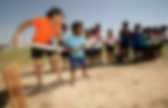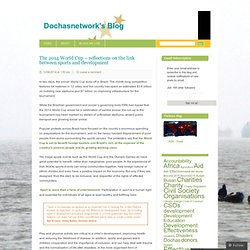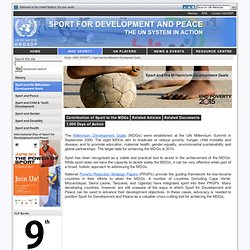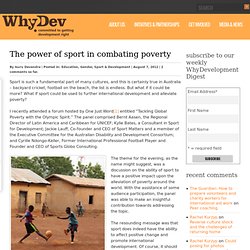

The 2014 World Cup – reflections on the link between sports and development. 10/06/2014 at 1:50 pm In two days, the soccer World Cup kicks off in Brazil.

The month-long competition features 64 matches in 12 cities, and the country has spent an estimated $3.6 billion on building new stadiums and $7 billion on improving infrastructure for the tournament. While the Brazilian government and soccer’s governing body FIFA had hoped that the 2014 World Cup would be a celebration of samba soccer, the run-up to the tournament has been marked by stories of unfinished stadiums, absent public transport and growing social unrest. Popular protests across Brazil have focused on the country’s enormous spending on preparations for the tournament, and on the heavy handed displacement of poor people from slums surrounding the sports venues.
The protesters say that the World Cup is set to benefit foreign tourists and Brazil’s rich, at the expense of the country’s poorest people and its growing working class. Sport is more than a form of entertainment. Www.christianaid.org.uk/images/blowing-the-whistle-caweek-report.pdf. Mega_event_boekje.pdf. Sports & Dev: an impact study. UN: sports & the MDGs. The Millennium Development Goals (MDGs) were established at the UN Millennium Summit in September 2000.

The eight MDGs aim to eradicate or reduce poverty, hunger, child mortality and disease, and to promote education, maternal health, gender equality, environmental sustainability and global partnerships. The target date for achieving the MDGs is 2015. Sport has been recognised as a viable and practical tool to assist in the achievement of the MDGs. While sport does not have the capacity to tackle solely the MDGs, it can be very effective when part of a broad, holistic approach to addressing the MDGs.
National Poverty Reduction Strategy Papers (PRSPs) provide the guiding framework for low-income countries in their efforts to attain the MDGs. UN Secretary-General's video message about the need to accelerate action on the MDGs in the 1,000 days until the 2015 target date. Sports & dev fact sheet (2010) The UN's Perspective on Sport & Development. The power of sport in combating poverty. Sport is such a fundamental part of many cultures, and this is certainly true in Australia – backyard cricket, football on the beach, the list is endless.

But what if it could be more? What if sport could be used to further international development and alleviate poverty? I recently attended a forum hosted by One Just Word[1] entitled “Tackling Global Poverty with the Olympic Spirit.” The panel comprised Bernt Aasen, the Regional Director of Latin America and Caribbean for UNICEF; Kylie Bates, a Consultant in Sport for Development; Jackie Lauff, Co-founder and CEO of Sport Matters and a member of the Executive Committee for the Australian Disability and Development Consortium; and Cyrille Ndongo-Keller, Former International Professional Football Player and Founder and CEO of Sports Globo Consulting.
Girls playing football in northern Ghana. The resounding message was that sport does indeed have the ability to affect positive change and promote international development. Harnessing the power of sport.